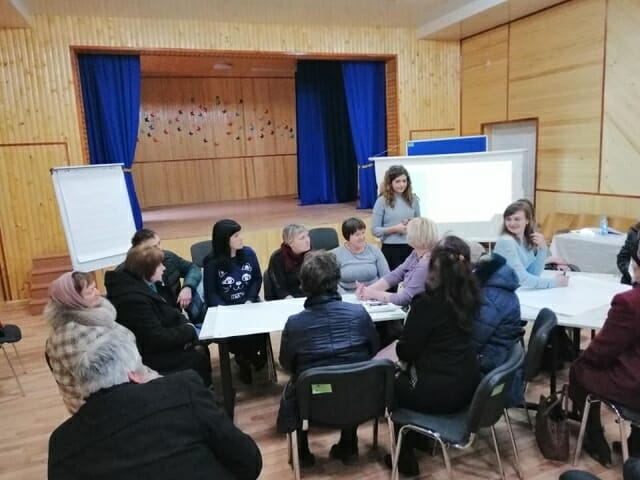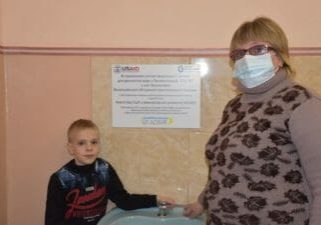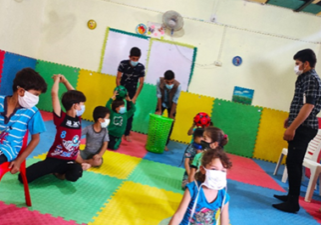News > Blog
Reducing Corruption and Increasing Transparency of Authorities in Ukraine
Published 08/28/2020 by globalcommunities

Anti-corruption and decentralization reforms have become key priorities in the Ukrainian program of new reforms, which are important in the country’s path to European integration. A poll conducted in 2019 by the Democratic Initiatives Foundation together with the Razumkov Center’s sociological service showed that 62% of the population believe the anti-corruption reform is a priority, and is considered even more important than medical or social reforms. The anti-corruption reform is especially important for the consolidated communities (CCs) established as part of decentralization reform. Newly established CCs have received more financial resources; they have formed direct relations with the national budget which has led to wider mandates and obligations. Meanwhile, these communities have also seen a rise in potential corruption risks.
So what should CCs do to reduce such corruption risks and enhance the openness and transparency of local authorities? This question is especially relevant if the CC is small.
Since 2018, the Ukrainian Communities Countering Corruption Together (UCCCT) Project has been cooperating with 19 CCs in 13 oblasts. Both large city and small village communities take part in the project. The project’s approach is based on the idea that rather than creating more bureaucracy and red tape, anti-corruption tools should be integrated directly into existing structures for efficiency and efficacy.
This is the path chosen by Ust-Putylska CC in Chernivtsi Oblast, a small mountain community that amalgamated in 2015. The CC has an area of 92.06 sq. km and a population of 2,231 people.
Despite its small size and complicated geographical location, the community management and its residents are working hard to improve conditions within their community by being creative and optimizing their resources.
As part of the UCCCT Project, the community selected a set of anti-corruption tools they wanted to implement.
One such tool was the establishment of a Public Anti-Corruption Council – a temporary advisory body created to facilitate public participation in the formation and implementation of the state policies, including preventing and combating corruption. However, instead of creating a separate Anti-Corruption Council, the community decided to optimize its resources and add a part of its functions to the already approved Public Council.
“We have made relevant changes to the provision on the Public Council, added several new members,” says Olena Zavorotchenko, UCCCT Project expert. “This way, we managed to launch the process of anti-corruption mechanism implementation with minimum efforts.”
During the first six months of the new Public Council operation (from July 2019 to January 2020), community members submitted three conflict of interest applications. The Public Council is conducting an active awareness-raising campaign on the compulsory declaration and correct completion of tax returns for communal enterprise managers, which are required under national legislation. Prior to the council formed under the UCCCT Program, the community had difficulty providing consultations or holding awareness-raising campaigns on this issue due to a lack of staff and resources. Optimization of resources through the creation of the Public (Anti-Corruption) Council allowed the community to resolve this issue in a short period with minimal efforts.
With help from the program, the CC is forming supervisory boards within educational and healthcare institutions that are open for any concerned community residents to join.
For instance, a supervisory board was created within Marynychi Communal Non-Profit Enterprise and another board was established within the educational institutions of Ust-Putylska CC. In addition, “Skarby Mudrosti” Honorary Council actively operates in the community. It was established to ensure the participation of senior residents in community development and communal institutions as well as to encourage their cooperation with local self-government authorities.
Supervisory boards also help build residents’ trust in the steps taken by the management of educational and healthcare institutions.
At the first session of the supervisory board within educational institutions of Ust-Putylska CC, the school principal submitted for its consideration a case concerning the allocation of funds for transportation of students from neighboring villages to their school. Opening this decision to the supervisory board ensured transparency and increased trust in the decision making process, as the board is made up of residents who have no personal interest in protecting inappropriate or even corrupt decisions.
Another important stage in the movement towards enhanced transparency is the creation of a “Citizens’ Budget” – an innovative tool for providing information on the budget and involving citizens in the budgeting process. This tool helps to explain complicated budget issues in convenient formats: infographics, interactive presentations, printed publications with visualized data describing how and where community money is used.
“The Citizens Budget helps citizens understand how the budget influences the lives of all residents. It helps to better explain information on the budget and promote accountability and transparency alike,” notes Anatoliy Boyko, “For Transparent Local Budgets!” Partnership coordinator.
Through the “Citizens’ Budget,” this small community showed its creativity and eagerness for engaging in the budgeting process. They set up a specialized working group (citizen integrity coalitions) consisting of financiers and community representatives. Each budget contains information for citizens concerning sources of income and priority areas of community funding, including schools, hospitals and community staff salaries.
For the second year in a row, Ust-Putylska CC has worked with project experts to share their “Citizens’ Budget” with community members in the form of a board game: it has rules, questions and answers, as well as a map that may be used for the game. In addition, it provides a detailed explanation of budget process principles, the budget cycle, and data on expenses and income.
“Developing a Citizens’ Budget of our community has become our tradition. After all, this is a great opportunity to involve community citizens in the control over budget flows and the discussion of their intended use,” notes Nataliya Frey, Head of Ust-Putylska CC.
These and other anti-corruption tools continue to help CCs across Ukraine to effectively realize anti-corruption and decentralization reforms. These tools improve interactions between local authorities and the population, minimize corruption, and optimize resources. Transparency, openness, and accessibility are the main characteristics of capable communities. The UCCCT Project is designed to help communities exemplify these characteristics, and make sure each citizen can benefit from, and be an active participant in, reforms in their community.






